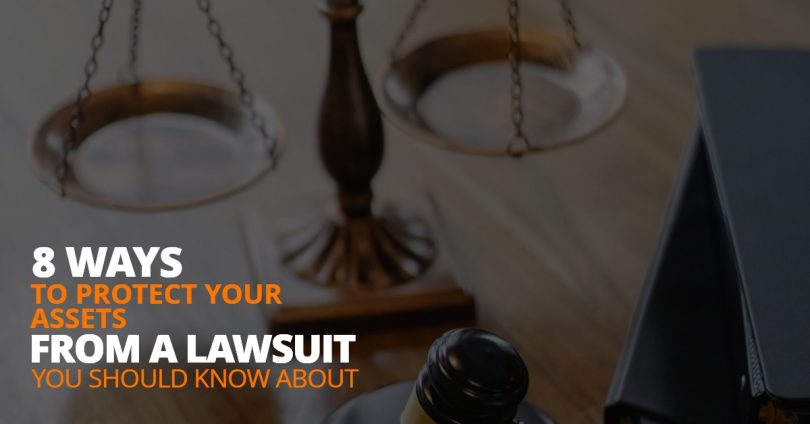Protecting your assets is essential, and defensive measures can help safeguard them from creditors in the event of unfortunate circumstances such as a lawsuit or bankruptcy. By taking proactive steps now, you can ensure that these events don’t rob you of what matters most.
1. Use Business Entities
Establishing the right business entity is essential for protecting your personal assets. To give yourself security and peace of mind, you should evaluate all available options before making a decision – from corporations to LLCs and limited partnerships. Don’t expose yourself unnecessarily; create formal protection so that even in an event of dispute or litigation, you can rest assured knowing that your personal wealth remains secure!
Here are several business entities to take into account…
Sole Proprietorships. As a sole proprietor, you bear the full brunt of personal risk and liability. Any misstep can put your assets at considerable peril – including much more than just lost income or profits.
General Partnerships. Working in a general partnership can lead to some hefty risks, with you and your business partner being held jointly liable for any lawsuit that arises. It’s important to consider whether the other person is apt to make decisions which could result in legal repercussions – as this may then reflect upon yourself!
Limited Partnerships. Investing in a limited partnership allows you to enjoy the rewards of being an entrepreneur without taking on all the risks. By limiting your personal involvement and responsibilities, you can protect yourself from liability beyond just what’s been invested – meaning any claims against the business cannot be extended to pursue assets outside it. However, should you choose to step into a leadership role and take control over managing operations then this defense is lost – so wise investors bear that mind!
Corporations. Corporate entities are an excellent asset protection vehicle for owners, safeguarding them from the threat of lawsuits directed at their businesses. Generally speaking, only in cases where fraud has occurred would a person’s personal assets be vulnerable to seizure. When it comes to individual liability against people acting as business owners however – liabilities can reach further than just the corporate entity itself; such claims may extend into stock holdings and other resources belonging to that owner. Fortunately there exists two forms of corporations which offer comparable levels of defence: S Corporations & C Corporations with beneficial taxes features and share ownership restrictions applicable specific to each type respectively.
Limited Liability Companies.LLCs offer asset protection, flexible taxation options and – in certain jurisdictions – an effective ‘poison pill’ to deter lawsuits. Charging order protections allow owners of an LLC to shield their business operations from creditors, who may only be awarded a membership interest without gaining access or control over the company’s assets. Moreover, should a distribution occur as part of any settlement agreement with plaintiffs it can still be taxed but not forced on the entity itself making its defense more advantageous than that of other corporate structures such as S corporations.
2. Personal Insurance Ownership
With the potential for a lawsuit looming over certain professions, it is essential to ensure you are always adequately covered. Financial advisors, OBGYNs and real estate agents should all make sure that their errors & omissions coverage remains current and sufficient; sometimes investing in extra or expanded coverage can be the difference between staying afloat if sued or facing financial ruin. By striking an ideal balance of higher deductibles with increased protection amounts, those at-risk professionals will have peace of mind knowing they’ll remain safe from any unexpected lawsuits.
Here’s a list of coverages for you to consider…
Homeowners Insurance. Homeowners insurance provides a vital safeguard in the event that someone is injured while on your property. Select an achievable deductible and make sure you have sufficient liability coverage if ever faced with legal action due to injury-related claims.
Commercial Liability Insurance. Businesses require reliable protection from unexpected liabilities, and that’s why Commercial Liability Insurance is key. This type of insurance safeguards organizations if somebody gets hurt or suffers an injury due to the actions of their employees—giving you peace-of-mind in any situation!
Worker’s Compensation Insurance. Worker’s Compensation Insurance is a key element of any safe and successful workplace. No matter the jurisdiction, this insurance helps to protect both you and your team by guaranteeing that adequate coverage is in place for any employee who suffers from an injury on-site or even during work travel. This way everyone can rest assured knowing their finances are safeguarded against potential harm – giving them peace of mind at work!
Auto Insurance. With the right auto insurance coverage, you’re better prepared than simply relying on the minimum legal liability. Invest in an amount of additional protection that ensures your total liability will exceed the value of your assets should a lawsuit occur as a result of any accidents involving your vehicle. Get complete peace-of-mind with tailored plans specifically designed to fit your needs and budget!
Umbrella Coverage. Umbrella coverage is a type of backup insurance that can be relied on if your auto, homeowners or other liability coverages are not enough. If an individual files suit against you beyond what’s available in those policies, umbrella policy will provide up to $1 million (or more) in additional benefits – saving significant financial losses and protecting irreplaceable resources like property or retirement accounts from being seized. Ultimately, these powerful plans offer peace-of-mind and stress relief at very reasonable costs ($1-$5 million).
Long-Term Care Insurance. As we age, it becomes increasingly important to be aware of the financial risks posed by chronic medical conditions. Long-term care insurance provides a layer of protection against having to face potentially ruinous expenses such as in-home or nursing home costs for afflictions like dementia, Alzheimer’s disease, strokes and more. Unfortunately, Medicare offers minimal coverage while major health plans typically offer none at all – leaving you vulnerable and facing sometimes daily costs up to $200 until your finances no longer qualify for aid from Medicaid programs. The earlier you consider long term care insurance options the smaller premiums will likely be; but when looking into these policies keep in mind that some illnesses might make them prohibitively expensive – if not altogether unavailable – so act fast!
3. Utilizing Retirement Accounts For Asset Protection
Retirement accounts offer a strong level of protection for your assets under federal law. ERISA-qualified retirement plans have unlimited asset protection, and IRAs can have up to $1 million in protection in the event of bankruptcy. Depending on the state, IRAs may have even more protection, although some states have opted out of the federal bankruptcy exemptions provided by the 2005 Bankruptcy Reform Act, which could result in lesser protection for these accounts.
It is essential to check the laws in your state to determine the amount of protection offered to funds in retirement accounts. Additionally, consulting with an attorney who is familiar with the laws in your state can help determine whether creditors can opt between the state and federal exemption amounts.
If your state has a generous exemption, it may be beneficial to move cash that you will not need until you reach at least age 59 1/2 into a protected retirement account. However, it is important to remember that annual contribution limits vary depending on the type of retirement plan, and exceeding these limits or withdrawing funds before age 59 1/2 could result in penalties. While retirement accounts offer substantial tax benefits and long-term savings protection, it is crucial to understand their limitations and use them carefully.
4. Homestead Exemptions
Homeowners in some states have a major advantage when it comes to protecting their home equity during bankruptcy proceedings. Texas and Florida are two prime examples, as they provide an unlimited homestead exemption that can shield all of your property value should the worst happen. Other states might not offer such generous protections, so be sure to check out local regulations to see what type of coverage you’re entitled too.
5. Titling
Protect your assets and co-owned property by exploring the titling options available to you. Tenancy by the entirety is a legally binding agreement between married couples that protects their primary residence from creditors of one spouse, however this option may not be applicable in some states or for investment properties. If tenancy by the entirety does not apply, consider other forms such as joint tenancy with rights of survivorship or tenants in common which provide legal protection upon death of an owner(s). To understand what title best suits your needs and securing maximum asset protection during ownership change events, we advise consulting a qualified lawyer licensed in your state who can guide you through these considerations.
6. Annuities And Life Insurance
Annuities and life insurance can provide peace of mind, but it’s important to know the amount your state protects these assets. For instance, Florida has unlimited protection while Oregon offers up to $500 per month in annuity income depending on its laws – so always check with a licensed attorney for specific exemptions related to where you live!
7. Transfer Assets To Your Loved Ones
Having control of your assets is essential for financial security. Strategically transferring ownership to irrevocable trusts can protect them from creditors, while providing an income stream or inheritance for loved ones down the line.
Only consider this option if you have enough funds and transferring ownership won’t result in insolvency.
Transferring assets to your heirs early can be an excellent way to ensure they benefit from the wealth you have built. However, it is important that careful consideration and planning goes into any asset transfers; while a traditional will may seem sufficient, establishing trusts are often the best solution for giving away wealth securely. Ultimately, no matter who receives these gifts of inheritance in advance – remember not to take their ability or willingness to support you when necessary for granted.
8. Safeguard Your Future Today – Take Steps To Protect Yourself And Ensure A Secure Tomorrow
Time is of the essence if you want to protect your assets from legal implications. Taking proactive steps now can be instrumental in ensuring the court does not rule that transferring funds into a protected class constituted fraudulent conveyance, leaving them vulnerable. In addition to making prudent financial choices, it’s best practice to avoid flashy spending as this may attract attention and lead lawyers towards taking on otherwise passable cases against you.







